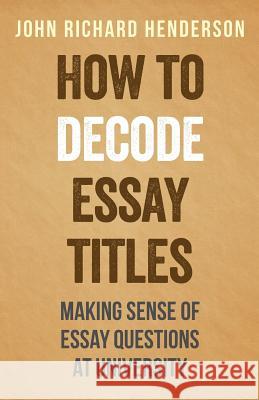How To Decode Essay Titles: Making Sense of Essay Questions at University » książka
How To Decode Essay Titles: Making Sense of Essay Questions at University
ISBN-13: 9781496180438 / Angielski / Miękka / 2014 / 102 str.
"Assess the proposition..."
"Explore the theory..."
"Critically examine..."
As a student, you're supposed to work out what kind of essay you're expected to write by reading the title. But often, essay questions are so cryptic and perplexing that it's hard to make any sense of them. When you can't figure out what a question is asking you to do, you sink into despair and exasperation.
The usual advice that's given in this situation is "underline the keywords"-but in reality, this leads nowhere.
"How To Decode Essay Titles" takes a different approach. It categorises all of the different questions that students are likely to meet into seven clearly defined types, and allows you to compare your question with each type until you find a match.
Once you've found the matching type, it explains what that kind of question wants you to do and then offers some suggestions for how you might do it.
In a matter of minutes, this method will allow you to obtain the four things that you need to determine from an essay question-no matter how unfriendly or cryptic it is... Task: The book shows you how to identify a title's task and then suggests the best response by providing either recommended outlines or strategies for developing your own structure. Outline: Apply the suggested outline to your own assignment to instantly give you a suitable plan for the structure of your work. Now you're not wondering what you're going to write, because you have a framework which shows how your essay will start, develop and finish. Subject: Writing 2 or 3 thousand words can seem like a tough target to reach. But this method will show you how to expand upon the title's subject to hit the word limit. Information sources: Once you have a plan for your essay, you'll need to know what you're looking for when you head to the library, and this book tells you. "How To Decode Essay Titles" is written in an informal style to explain a method which can be applied to both coursework and exam questions. The technique is illustrated with dozens of sample essay questions and finishes with three fully worked examples.
""The book will definitely help students in their approach to their essays. It's solid and very clear information.""
- Dr. Simon Constantine, University of Wolverhampton
What's inside:
How the rules of essay writing have changed between school and university and why What the people teaching your course expect to see when they read your essay The 4 things that you need to discover from an essay question The usual advice (which fails) and an alternative 3-stage method (which works) The 4 essay tasks you'll be given which lead to an outline The 3 essay tasks you'll be given that don't lead to an outline, why they don't and what you can do about it Variations on those 7 tasks, explained and illustrated with sample questions Why it's good news when a question's subject has more than one aspect (with sample questions) The different kinds of aspects from which you can view a question's subject What to do when you can't see more than one aspect (plus some other things to look out for) The importance of preliminary reading and what it can provide you with Where to start your preliminary reading and how to tell when you've done enough Putting it all together: the complete decoding sheet 3 example questions, each of which are fully decoded to demonstrate this method "How To Decode Essay Titles" is also available on Kindle and other devices.
Zawartość książki może nie spełniać oczekiwań – reklamacje nie obejmują treści, która mogła nie być redakcyjnie ani merytorycznie opracowana.











